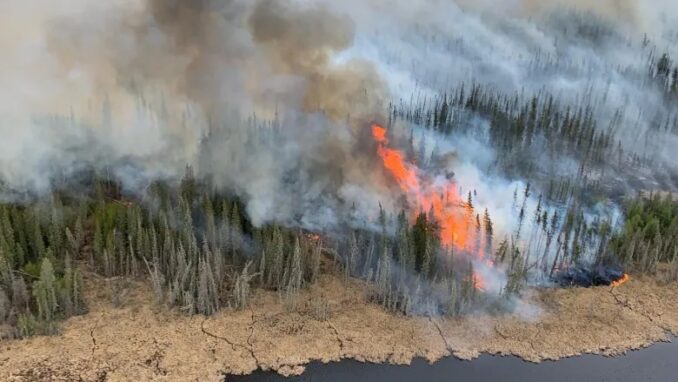Wildfires threaten Indigenous First Nations lands
This month, wildfires continue to devastate Indigenous First Nations lands in the western part of so-called Canada. At least 91 fires have broken out, 25 of which authorities have admitted are out of control as of May 20. Over 964,000 acres of land have burned thus far.

Wildfire burning on the K’atl’odeeche First Nation, 2023. (Photo: Matt Adams)
Smoke from the fires has spread as far as the U.S. mid-Atlantic. In total, over 29,000 people have been evacuated over the past two weeks. A record-breaking heatwave in Canada and the Pacific Northwest — the result of the ongoing climate disaster — is fueling this wildfire outbreak, which experts predict will only get worse as temperatures continue to climb.
Currently, the Little Red River Cree Nation and the Sturgeon Lake Cree Nation are experiencing the greatest destruction, with dozens of homes reported destroyed. Fox Lake, the largest town in the Little Red River Nation, lost at least 44 buildings, and all 3,700 of its residents had to evacuate last week.
At the Sturgeon Lake Cree Nation fires destroyed the power grid and forced a water-treatment plant to shut down. “This is going to take several weeks to sort out,” said Sheldon Sunshine, Chief of the Sturgeon Lake Cree Nation. (CBC, May 9)
Wildfires have also spread to the K’atl’odeeche First Nation, displacing hundreds more residents. Over the past two weeks, thousands of citizens of four First Nations have evacuated, and a dozen more First Nations and at least one Métis community remain at risk.
“It’s really been an emotional roller coaster,” said evacuee Gary Moostoos, a citizen of the Sturgeon Lake Cree Nation, in an interview with Canada Broadcasting Corporation (CBC). “At the reserve we have our own areas that we live in; it’s like clusters of families. And within those clusters, we also have the environment around us . . . especially the medicines and the berry bushes we grew up in — and those are all gone.” (tinyurl.com/hhr92j9c)
‘Devastating, life-altering situation’
First Nations and Métis leaders have described how the wildfires have disrupted the lives of their residents, many of whom have lost access to traditional and vital food sources, including moose and other game animals. “There’s one [resident], he’s lost everything,” said Dave Lamouche, President of the Alberta Métis Settlement Council. “his trapping equipment and guns, his hunting supplies — really devastating, life-altering situation, absolutely.”
In the East Prairie Métis Settlement, wildfires have destroyed at least 14 homes, and forced all 300 residents to evacuate last week. Though many residents have returned, they remain under evacuation orders. The community has gone without power since May 5.
East Prairie Métis Settlement Council member Reva Jaycox fears the fires could come back. “We’re not out of the woods yet,” she said in a CBC interview. “We still have the potential of losing even more homes.” (CBC, May 11)
As of this writing, the wildfires have affected over 12 First Nations and at least three Métis communities, including the Little Red River Cree Nation, O’Chiese First Nation, Sunchild First Nation, Whitefish Lake First Nation #459, Saddle Lake Cree Nation, Heart Lake First Nation, Swan River First Nation, Driftpile Cree Nation, Sturgeon Lake Cree Nation, Alexis Nakota Sioux Nation, Stoney Nakoda First Nation, Beaver First Nation and the East Prairie Métis Settlement.
Global threat to planet’s biodiversity
Sparked by worsening climate-change conditions, such as drought and extreme heat, wildfires have proliferated around the globe, threatening Indigenous nations, which preserve over 80% of the planet’s biodiversity. A 2021 Canada Journal of Forest Research study found that on-reserve First Nation citizens are at disproportionate risk of wildfires compared to Canada’s settler population. (tinyurl.com/mua6x662)
Despite this, the settler-colonial regimes of Canada and the U.S. — as well as those of Australia, Israel and New Zealand — are worsening the climate crisis by imposing pipelines, fracking and strip-mining projects that devastate Indigenous lands and poison water supplies.
Alberta, the Canadian province most affected by the wildfires, is also one of the Canadian settler state’s largest fossil fuel-producing regions, releasing over 250 million tons of carbon dioxide every year. (tinyurl.com/2p82pfnm) Much of the attention and response to the wildfires, therefore, has focused on the “threat” they pose to oil extraction, revealing the priorities of capital, which depends on the exploitation of Indigenous resources at the expense of Indigenous lives.
Any lasting solution to the ongoing environmental disaster caused by capitalism requires complete solidarity with Indigenous nations in their struggle to dismantle settler colonialism and reclaim their stolen lands.

